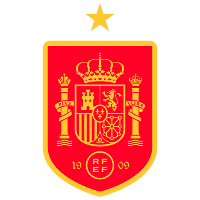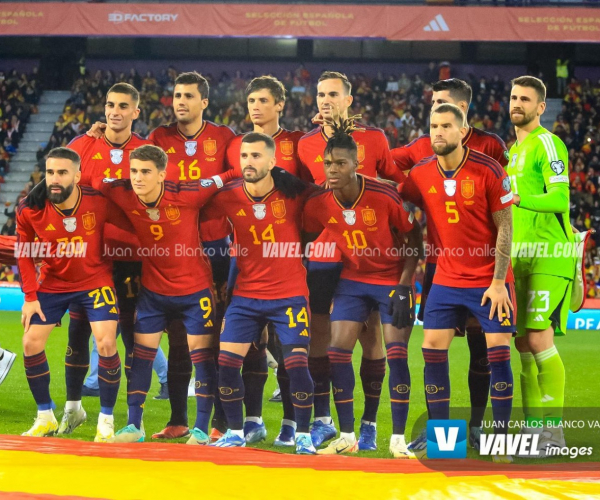
Selección Española de Fútbol

1920
The Spanish National Soccer Team, affectionately known as "La Roja", is one of the most successful and respected teams in the world of soccer. Its history, full of triumphs, challenges and unforgettable moments, is a reflection of its evolution and growth in the international arena. The following is a detailed biography of the Spanish National Team, divided into sections for a better understanding of its rich history.
Origins and First Steps
The official history of the Spanish National Team begins in 1920, during the Antwerp Olympic Games. In this tournament, Spain made its first appearance and won a silver medal, a remarkable achievement that laid the foundation for its soccer future. This team boasted legendary figures such as Zamora in goal and Pichichi up front, names that today remain synonymous with excellence in Spanish soccer.
Early Successes and Development
Spain's victory in the 1964 European Championship was not only a sporting triumph, but also a historical and cultural milestone for the country. Hosting and winning the tournament on home soil at a time when Spain was isolated internationally under the dictatorship of Francisco Franco was a flash of national pride and a symbol of hope for many Spaniards. This success at the Santiago Bernabeu Stadium, with a team led by the likes of Luis Suarez - Spain's only Ballon d'Or winner to date - and the decisive goal by Marcelino Martinez against the Soviet Union, not only raised the international profile of Spanish soccer but also demonstrated Spain's ability to compete at the highest level in the sport. Euro 1964 became a turning point, marking the beginning of a gradual development that would lead to Spain becoming one of the dominant forces in world soccer.
In terms of changes and evolution in technical direction, the arrival of Ladislao Kubala as national coach in 1969 ushered in an era of stability and technical growth. Kubala, a legend as a player, brought with him a wealth of experience and a new playing philosophy. His tenure spanned a decade, a period in which Spain experienced ups and downs in performance, but always under the vision and style of play that Kubala sought to implement. Although major World Cup successes eluded him, his influence went beyond immediate results, laying the foundations for the future development of Spanish soccer and paving the way for the successes that would come in the following decades. Kubala is remembered not only for his strategies and tactics, but also for his ability to inspire and lead his players, becoming an iconic and respected figure in the history of the Spanish national team.
These periods form crucial chapters in the chronicle of the Spanish national team, marking the beginning of its rise on the international soccer scene and the consolidation of a soccer identity that would be characterized by technique, passion and commitment to the beautiful game. The 1964 European Championship and the management of Kubala are early examples of the potential and ambition of Spanish soccer, elements that would be fundamental to its future successes in the 21st century.
The 1982 World Cup
The 1982 World Cup, held in Spain, was a turning point in the history of Spanish soccer. Although the host team did not achieve an outstanding performance, this event served to show the world the passion and love for soccer that exists in Spain.
The Luis Aragonés Revolution: Euro 2008
The Spanish National Team's road to international glory began with Euro 2008 under the leadership of Luis Aragonés. This tournament was not only a turning point for Spanish soccer, but also marked the birth of the style of play known as "tiki-taka", characterized by ball control, short passing and intense pressure on the opposition. Spain dazzled the world with their play and reached the final after beating the likes of Italy in the quarterfinals and Russia in the semifinals. The final against Germany was settled by a goal from Fernando Torres, securing the title for Spain and ending a 44-year drought without winning a major international tournament. This success redefined Spanish soccer and laid the groundwork for the triumphs to come.
World Cup conquest: South Africa 2010
The 2010 World Cup in South Africa was the biggest challenge for the golden generation of Spanish soccer. Under the leadership of Vicente del Bosque, Spain arrived at the tournament with high expectations, but faced difficulties from the start, losing their first match against Switzerland. However, the team recovered and advanced through the group stage with victories over Honduras and Chile. In the qualifiers, Spain showed its quality, beating Portugal, Paraguay and Germany on the way to the final. The decisive clash against the Netherlands was settled in extra time with an unforgettable goal by Andrés Iniesta, giving Spain its first World Cup title. This victory was not only a sporting achievement but also a moment of national unity and pride, consolidating the legacy of an exceptional generation of footballers.
Defending the European Throne: Euro 2012
After the World Cup triumph, Spain faced Euro 2012 with the goal of defending its European title. With Vicente del Bosque still at the helm, the national team continued to demonstrate its dominance in continental soccer. The team sailed successfully through the group stage and the knockout rounds, highlighted by a semifinal victory over Portugal in a penalty shootout. The final against Italy showed the world Spain's superiority, with a crushing 4-0 victory, highlighted by goals from David Silva, Jordi Alba, Fernando Torres and Juan Mata. This triumph made Spain the first team to win two consecutive European Championships with a World Cup in between, a historic achievement that underlined the golden era of Spanish soccer and made it one of the greatest teams of all time.
Reflections on a Golden Era
The consolidation and international successes of the Spanish national team during this period marked a golden era unprecedented in its history. The influence of visionary coaches such as Luis Aragonés and Vicente del Bosque, combined with a generation of exceptionally talented players, took Spanish soccer to unprecedented heights. These achievements not only transformed the perception of Spanish soccer worldwide but also left a lasting legacy that continues to inspire future generations. The golden era of Spanish soccer is a testament to the power of teamwork, tactical innovation and an unwavering commitment to excellence in the sport.
Youth and Talent Development
The Spanish National Team has not only excelled at the senior level, but has also played a leading role at the youth level, winning multiple titles in U-21, U-20, U-19, U-17, and U-15 tournaments. These successes reflect the profound work of developing and training players in Spain, ensuring a promising future for the national team.
Women's Soccer and Other Modalities
Women's soccer in Spain, which began unofficially in 1971, has seen exponential growth in recent decades. The women's national team, made official in the 1980s, has achieved important victories and recognition at the international level, marking the beginning of a new era in Spanish soccer. In addition, Spain has national teams in beach soccer and futsal, highlighting the diversity and talent in different modalities.








































